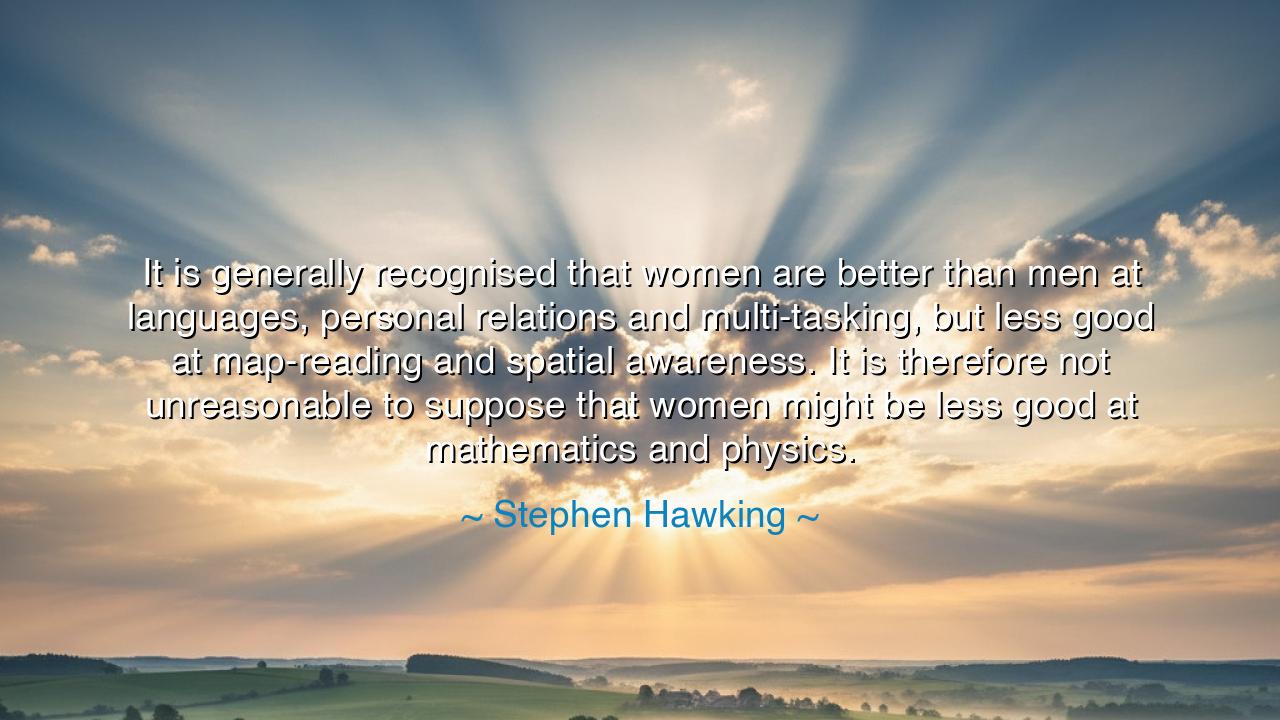
It is generally recognised that women are better than men at
It is generally recognised that women are better than men at languages, personal relations and multi-tasking, but less good at map-reading and spatial awareness. It is therefore not unreasonable to suppose that women might be less good at mathematics and physics.






Hear, O children of inquiry, the voice of Stephen Hawking, who, though bound in body, ranged far beyond the stars. He declared: “It is generally recognised that women are better than men at languages, personal relations and multi-tasking, but less good at map-reading and spatial awareness. It is therefore not unreasonable to suppose that women might be less good at mathematics and physics.” In this utterance, he touched upon the ancient and contentious question of difference between the sexes, and how such differences shape the realms of knowledge.
For Hawking’s words reflect both the strengths and the supposed limitations of women as understood by his time. He recognized women’s gift for language, relationships, and multi-tasking, traits woven into their daily lives through centuries of nurturing, teaching, and balancing many roles. Yet he also suggested their weakness in spatial awareness, and by extension, in the sciences that rely upon it. Whether true or flawed, his observation shines a light on society’s long struggle to reconcile gender with genius.
History gives us both agreement and defiance. For centuries, women were barred from mathematics and physics not because of lack of ability, but because of lack of opportunity. Yet figures like Hypatia of Alexandria, Émilie du Châtelet, and Marie Curie broke these barriers, excelling in precisely those fields where they were told they could not succeed. Their triumphs remind us that cultural expectation often shapes perception more than innate nature.
Hawking himself, though revered as one of the greatest physicists, was also a man of his era, echoing assumptions that had been passed down for generations. His words, when weighed with care, show how even the most brilliant minds can carry forward societal biases. Yet they also open the door for discussion—for how else can change begin, except by challenging what is “generally recognised”?
Therefore, let this wisdom endure: differences between men and women may exist, but they are not chains, only variations of strength. The history of science proves that women, when given the chance, have matched and surpassed every boundary set before them. Hawking’s words must not be taken as final law, but as a call to examine, to question, and to ensure that no soul is denied the right to shine in mathematics, physics, or any realm of knowledge. For genius belongs not to gender, but to the human spirit.






DVDang Vinh
Stephen Hawking’s comments about women’s skills in certain areas seem to perpetuate an oversimplified view of gender differences. Are we truly less capable in math or spatial awareness, or are these just areas where we’ve been historically underrepresented? How can we shift the narrative to better recognize the potential of all individuals, regardless of gender, in fields like physics, engineering, and mathematics?
TDHoang Thuy Dung
The statement about women being 'less good at mathematics and physics' raises some important questions. Does this reflect inherent biological differences, or does it simply reflect societal expectations that discourage women from pursuing these fields? Is it possible that women are just as capable in these areas, but the lack of representation and support prevents them from excelling? How can we challenge these outdated notions and encourage more gender inclusivity in STEM?
BDCao Le Bao dat
While Stephen Hawking’s quote is based on common gender assumptions, it’s concerning that such stereotypes might perpetuate harmful ideas about women’s capabilities, especially in subjects like math and physics. How do you think these ideas impact young girls who might be interested in these fields? Do we need to rethink how we nurture talent in different areas, regardless of gender, to encourage more women in STEM?
TN11_1-Nguyen Trung Nhan
Hawking’s comment seems to suggest that gender differences could explain why women are underrepresented in fields like math and physics. But is this really a valid assumption, or is it just another way to rationalize inequality in these areas? Could societal biases and lack of encouragement play a bigger role in women’s performance in these subjects? How can we better support women in STEM to challenge these stereotypes?
Hhhhhh
Stephen Hawking’s statement about women and men’s abilities seems to reflect traditional gender stereotypes. While it’s true that some studies show differences in certain cognitive abilities, it’s important to question whether such generalizations are helpful or limiting. Are these differences truly biological, or are they influenced by societal expectations? How do these kinds of stereotypes affect women’s participation in fields like mathematics and physics?